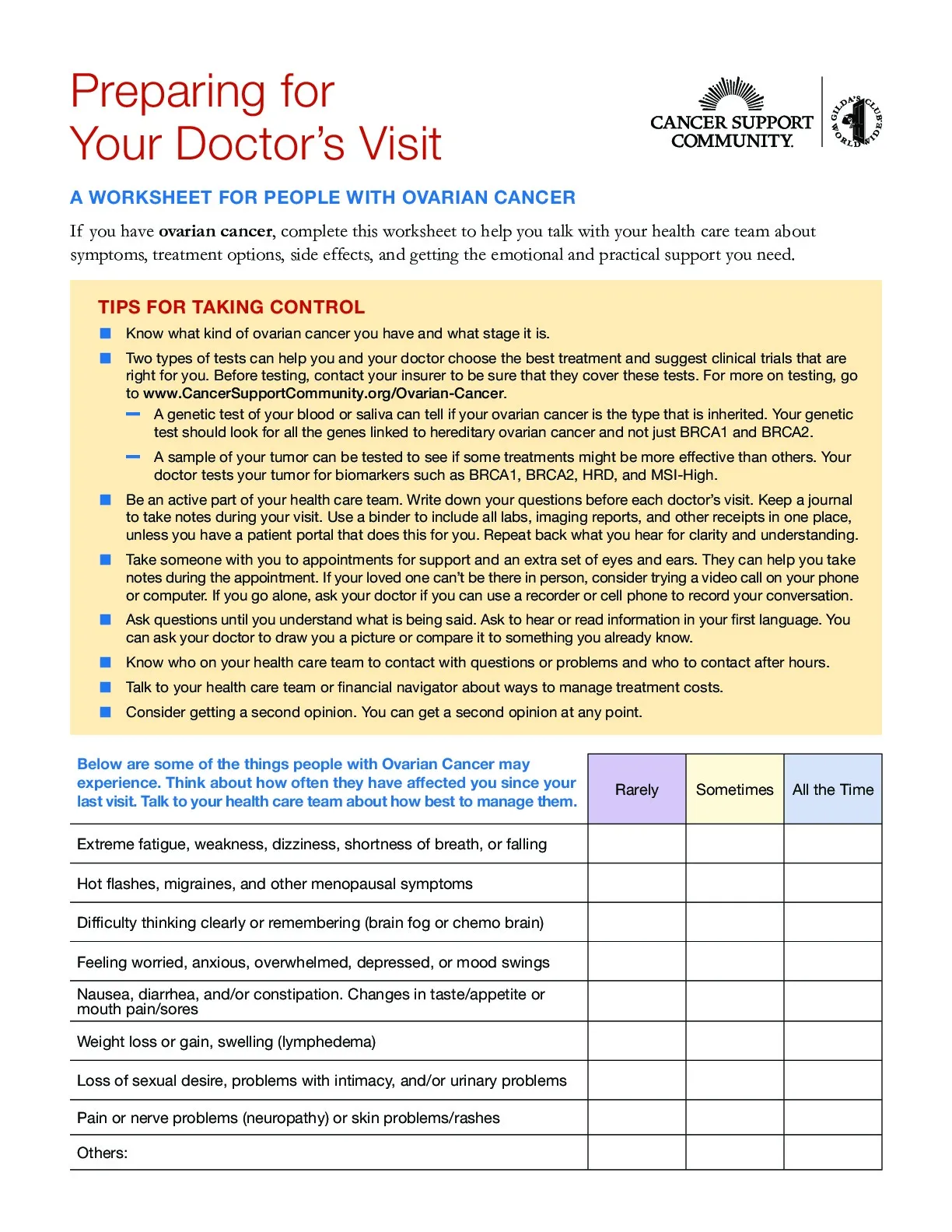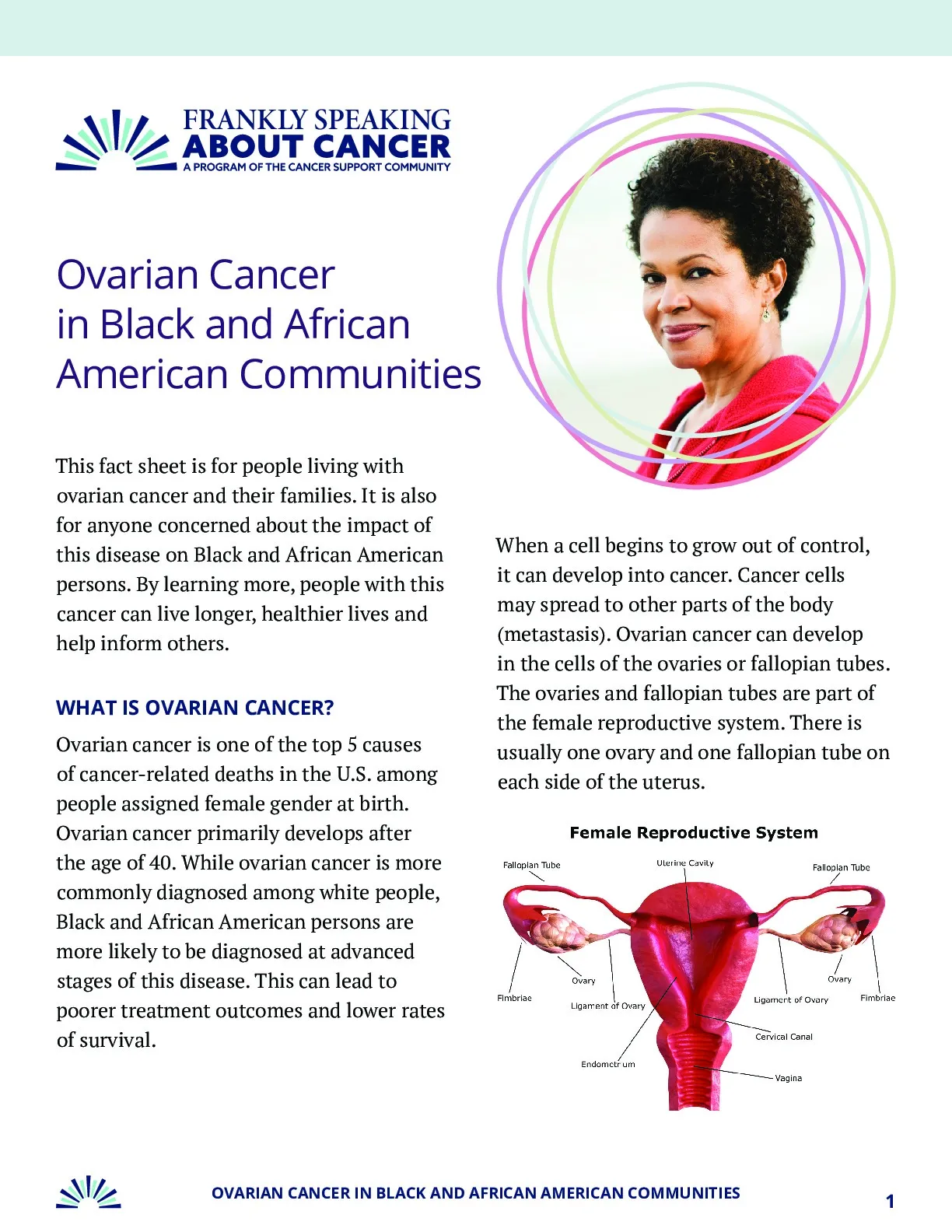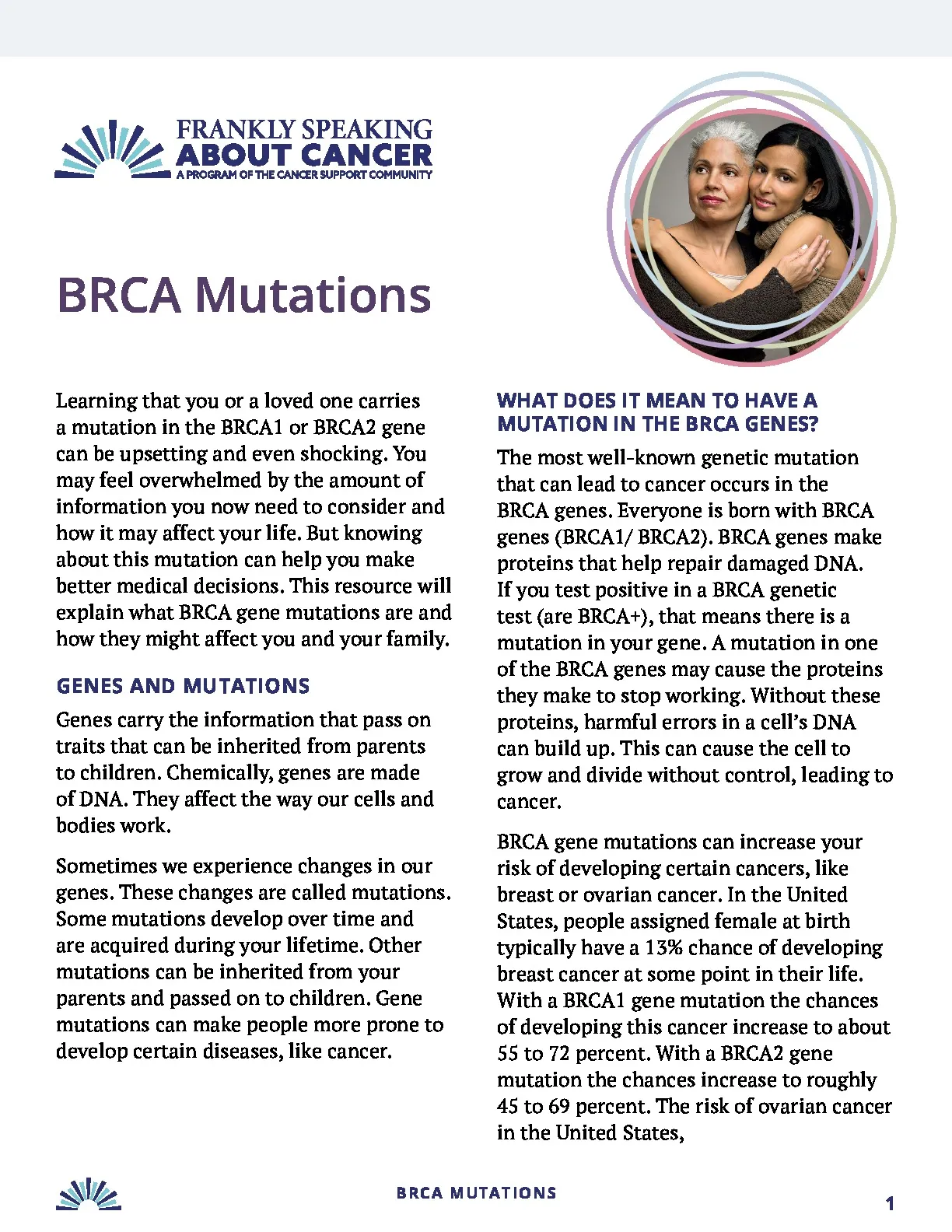Ovarian Cancer
Table of Contents
Ovarian cancer is a type of cancer that starts in the ovaries. More than 22,000 people in the United States are diagnosed with ovarian cancer each year. Ovarian cancer primarily develops after the age of 40. While ovarian cancer is more commonly diagnosed among white people, Black and African American people are more likely to be diagnosed at advanced stages of this disease. This can lead to poorer treatment outcomes and lower rates of survival.
The ovaries are part of the reproductive system. The female reproductive system usually has 2 ovaries, one on each side of the uterus. Each ovary is about the size of a walnut and has 3 parts:
- The epithelium covers the surface of the ovary and protects it.
- Germ cells produce the egg that is released each month. The egg travels through the fallopian tubes into the uterus. When fertilized, it can result in pregnancy.
- Sex cord-stromal cells produce sex hormones, such as estrogen.
If a cancer starts to grow in the epithelial cells of the ovaries, it is called epithelial ovarian cancer. Most cases of ovarian cancers — about 9 out of 10 — start in these cells.
Another part of the body near the ovaries and fallopian tubes is the peritoneum. This is a thin layer of tissue that lines the abdominal cavity. It also lines some of the organs in the abdomen and pelvis. The cells of the peritoneum, fallopian tubes, and epithelium are all related and similar in appearance.
Because their cells are so similar, fallopian tube cancer and peritoneal cancer are treated the same ways as epithelial ovarian cancer. You can develop peritoneal or fallopian tube cancer even if you have had your ovaries removed.
Ovarian cancer is a broad term that sometimes includes epithelial ovarian, fallopian tube, and peritoneal cancers. All 3 of these cancers are thought about and treated the same way.
Find information on other types of ovarian cancer
The most common type of ovarian cancer is high-grade serous adenocarcinoma. However, that is not the only one. There are several others.

Risk Factors
Risk factors are things that can increase the chance of developing a disease. Certain cancer risk factors can be changed. Others, like a person’s genetic history or age, cannot be changed. Some known risk factors that can increase the risk of developing ovarian cancer include:
- Being over the age of 40
- Being overweight or having obesity
- Having a history of endometriosis
- Having children later in life or never having children
- Having a personal or family history of ovarian, breast, or colorectal cancer
- Having certain genetic mutations, such as:
- BRCA1 or BRCA2 genes
- Hereditary Non-Polyposis Colon Cancer (HNPCC) or Lynch syndrome
- And others
Signs & Symptoms
It is important to be aware of the subtle symptoms of ovarian cancer that often get missed. The most common symptoms include:
- Fatigue
- Bloating or unexplained fullness
- Pelvic or abdominal pain
- Difficulty eating or feeling full quickly
- Increased urination or urge to urinate
- Pain or bleeding during sexual intercourse
If you experience ongoing symptoms that are new or unusual, talk with your doctor to make sure your concerns are addressed.

Diagnosis and Staging
Diagnosis
If you have signs or symptoms of ovarian cancer, your doctor may do a:
Pelvic and rectal exam: During this exam, the doctor inserts fingers into the vagina and rectum to check the pelvis. This is done to see if your ovaries are larger than normal.
Transvaginal or pelvic ultrasound (sonogram): Your doctor inserts a small ultrasound wand into the vagina to help them see the ovaries, fallopian tubes, and uterus.
CA-125 blood test: Ovarian cancer cells produce a protein called CA-125. Levels are sometimes higher than normal in people with ovarian cancer. CA-125 is not a perfect test and can be falsely elevated even if you do not have ovarian cancer.
CT scan: For this test, you lie on a bed that moves through an x-ray tube to take pictures of your internal organs. The test may use a contrast dye. Let your doctor know if you have had an allergic reaction to contrast dye in the past.
If your doctor thinks you have ovarian cancer based on your symptoms, exam, scans, or ultrasound, you should ask for a referral to a gynecologic oncologist. This type of doctor specializes in the diagnosis and treatment of cancers that occur in the ovaries or other female reproductive organs. Any surgery to look for ovarian cancer should be done by a gynecologic oncologist. Studies have found that ovarian cancer patients are more likely to have a better outcome if their surgery is done by this kind of doctor.
The only way to know if you do or do not have ovarian cancer is for a doctor to perform surgery or take a biopsy (a sample) of the tissue. The sample is then sent to a pathologist, a doctor who is an expert at studying cells. They will determine if it is ovarian cancer.
Staging & Types of Ovarian Cancer
You will need to have surgery to learn your cancer’s stage. During surgery, the gynecologic oncologist will remove as much of your cancer as possible along with any organs the cancer has spread to. This is called debulking.
The stage is a measure of how far the cancer has spread. These are the stages of ovarian cancer:
Stage I (1): Cancer cells are found only in one or both ovaries.
Stage II (2): The cancer has spread to another area of the pelvis but has not spread to the abdomen.
Stage III (3): The cancer has spread to the lining of the abdomen or lymph nodes.
Stage IV (4): The cancer has spread beyond the abdomen to organs such as the lungs or liver.
There are 3 grades of ovarian cancer: Grade 1, Grade 2, and Grade 3. The grade explains how fast the cells are growing. The lower the grade, the slower the growth. Low-grade serous epithelial cancer tends to be diagnosed in younger women and is slower growing. It is most often treated with surgery and often chemotherapy and/or hormone therapy. High-grade ovarian cancer is most often treated with surgery followed by chemotherapy.
High-grade serous adenocarcinoma is the most common type of epithelial ovarian cancer. It is seen in 7 out of every 10 people with epithelial ovarian cancer. The treatment section below focuses on high-grade serous ovarian cancer.
Treatment Planning
As you discuss treatment, you should be given the opportunity to ask questions and make choices along the way. Making these choices is called treatment planning.
Good communication with your healthcare team and loved ones will make treatment planning easier. Talk with them about your goals, needs, and preferences. Let them know what is important to you. Make sure you understand what your doctors are saying about the stage and location of the cancer. You should understand why one treatment might work better than another. Don’t be afraid to ask questions. When you have a preference about your cancer treatment, make that preference known. If you feel overwhelmed, ask the provider how you can contact a member of the team after the visit.
Treatment options will depend on:
- The type of ovarian cancer you have
- The stage of the cancer
- Your general health
- If you inherited a genetic mutation
- If your tumor has certain biomarkers that make it likely to respond to certain treatments.
As you plan your treatment, 2 things you will want to consider are:
- What is the goal of each treatment? This may be a cure, or it may be treatment to help you live longer with a good quality of life.
- What are the side effects of each treatment? Ask how side effects may affect your quality of life. Find out what you and your health care team can do to help you manage them.
Managing Side Effects
Get more details about cancer treatment side effects and how to manage them.

Genetic Testing and Biomarker Testing
If you or a loved one has been diagnosed with ovarian cancer, talk with your family. Sharing your family history with cancer and other diseases can help everyone prepare. Everyone can take action to better their health. Ask about testing. Two kinds of tests can provide more information about ovarian cancer:
Genetic testing looks for mutations or changes in your genes. Ovarian cancer can run in families through the BRCA (breast cancer) genes. It can also be caused by genes linked to Lynch syndrome. If you have ovarian cancer, ask for genetic testing. This is especially important if you have a family history of breast or ovarian cancer. If you test positive for BRCA or another cancer gene, talk with the genetic counselor about the next steps for you and for your family members.
Biomarker testing looks for biomarkers in your cancer sample. Biomarkers tell your doctor about the subtype of the cancer in your body. The test results can be used to help guide your treatment options. BRCA, HRD, LOH, and MSI-High, TMB, or dMMR are biomarkers linked to ovarian cancer. Even if you are not born with a BRCA mutation, your cancer cells may develop one. Knowing if you inherited a BRCA mutation or if your tumor developed one can help your doctor decide which treatments are best for you.
Treatment and Side Effects
Try to prepare in advance for each doctor’s visit. Write down a list of questions before any appointment. This can help you feel more organized and comfortable in talking to and working with your health care team.
You do not have to rush to decide about your treatment. Ask questions if you do not understand anything about your treatment or the terms your doctors are using. Bring someone along for support or to take notes. Also, consider asking if you can record your conversations with your doctor. It’s a lot of information to take in at one time. Having the recording will allow you to re-listen to the conversation as you consider your options. You may also want to talk to an oncology nurse. The nurse can help you understand your options and may have more time to talk through questions than your doctor does.
Get Help Preparing for Treatment Decisions
Open to Options is a decision support counseling program that can help you prepare for an appointment in which you will be making a treatment decision.

Review Your Treatment Options
There are several approaches to treating ovarian cancer. Surgery and chemotherapy are the main treatments.
Surgery is one of the main treatments for ovarian cancer. During surgery, the gynecologic oncologist will remove as much of your cancer as possible. If the cancer has spread, other organs may also need to be removed.
Any surgery to look for ovarian cancer should be done by a gynecologic oncologist. If you do not have one in your town or city, consider traveling to a major medical center that does. The gynecologic oncologist who does the surgery can refer you to a local doctor for the rest of your treatment.
Chemotherapy is the other main treatment for ovarian cancer. Chemotherapy (also called chemo) uses drugs to destroy or damage fast-growing cells like cancer cells. It is used to shrink tumors, slow cancer’s growth, relieve symptoms, or help people live longer. Chemotherapy drugs are given in different ways (intravenously, orally by a pill, or by injection).
Your doctor may recommend chemotherapy before surgery (neoadjuvant). This can help reduce the size of the tumors, so they are easier to remove.
Targeted therapy uses drugs to target specific changes in cancer cells that help them grow, divide, and spread. Targeted therapy drugs are designed to be more precise. They fight cancer cells while causing less harm to other cells in the body.
Immunotherapy works with the body’s immune system to find, attack, and kill cancer cells. These drugs can work in different ways. Some boost the immune system, so it can fight cancer better. Other immunotherapy drugs help the immune system better recognize cancer cells.
Monitoring for Recurrence
After treatment, your doctor may review your CA-125 levels and order more scans to monitor your cancer. If your cancer returns, your doctor may determine if your cancer is platinum-sensitive or platinum-resistant. Platinum drugs are a type of chemotherapy.
- If the cancer comes back in less than 6 months, your cancer is platinum-resistant. This means you will probably not be treated with any other platinum therapies.
- If the cancer comes back in more than 6 months, your cancer is platinum-sensitive. This means you are likely to be treated again with platinum-containing therapies.
Maintenance Therapy
After you complete your chemotherapy treatment, your doctor may recommend maintenance therapy. Maintenance therapy is used to stop or slow your cancer’s growth or to prevent it from coming back.
Sometimes cancer that returns is not the same cancer you had before. This is a good time to ask again about clinical trials. There may be new trials available. You may also be eligible for trials you were not eligible for before.
Side Effects
Ovarian cancer and its treatments can cause a range of side effects. The most common include hair loss, nausea and vomiting, bone marrow suppression (such as anemia, weakened immune system, or risk of bleeding), nerve pain (neuropathy), fatigue, diarrhea or constipation, and swelling of limbs (lymphedema).
Before your treatment begins, talk to your doctor about the types of side effects that you may experience and how you can manage them. You can also ask your doctor for a referral to a palliative care specialist at any point. Palliative care can address side effects from treatments.
Sexual Wellness and Fertility
The side effects from treatment and the stress of having cancer can also lead to sex and intimacy issues with a partner. Communication is key. Talk to your partner about how you are feeling. Ask your doctor if you can engage in sexual activity during treatment. If there are certain sexual activities that your doctor tells you to refrain from, you can still maintain intimacy. You can do this through gentle touching, kissing, and physical closeness. A referral to a sexual health specialist can be helpful. Talk with your doctor about resources and support.
Some cancer treatments can affect people’s ability to have children. If you are thinking of having children, let your doctor know as soon as possible. It is important to talk with them before you start treatment. Some options, such as tissue freezing or egg banking, may be available to you. If so, you will need to begin any procedures before your cancer treatment starts.
Consider Clinical Trials
Clinical trials find new and better ways to prevent or treat cancer. A clinical trial may be the only way to gain access to a promising new treatment option. There are clinical trials available for all stages of the ovarian cancer journey.
A person’s age, gender, and even race or ethnicity may affect how their cancer responds to treatment. Because of this it is important to increase the diversity of participants in clinical trials. When people of diverse backgrounds participate in clinical trials, this helps to ensure the best treatment options are made available to them. The clinical trial results can also better show how new treatments will work with all patients.
Today the U.S. Food and Drug Administration (FDA) oversees clinical trials to keep all patients safe. Researchers must have their study approved by a review board before enrolling participants. Anyone who takes part in a study must go through a process called informed consent. This formal process explains the goals of the trial, potential benefits, any risks or side effects, and alternatives to participating. This is a good time to ask questions. You can also ask questions throughout the trial. Joining a trial is always voluntary. You have the right to stop participating at any point.
Coping With Ovarian Cancer
The more you know about your ovarian cancer diagnosis, treatment options, and possible side effects, the easier it will be to talk with your health care team to determine the best treatment plan for you. Ovarian cancer can affect all areas of your life. These resources can help:
Getting Support
Cancer stirs up many feelings. It affects you, your family, and your loved ones. It is normal to feel sad, anxious, worried, shocked, stressed, or panicked. Remember that cancer can affect anyone, and every person who has cancer deserves good care and support.
Tips for Coping
- Ask your health care team questions. Keep asking questions if there is something you don’t understand.
- Know what signs or symptoms you should tell your care team about right away.
- Control what you can. If you smoke, get help to stop. Find out what type of exercise you can do and how often. Eat healthy foods and try to maintain a healthy weight.
- Know that you will be more anxious when it gets close to a doctor’s appointment. Be gentle with yourself when you are feeling stressed.
Find the Support You Need
- Share your feelings with friends, family members, a counselor, or a clergyperson or spiritual advisor.
- A counselor or therapist can help you with anxiety. Other things that can help are yoga, breathing, and relaxation exercises.
- Ask for help from friends and your community, or ask your caregiver to do so. MyLifeLine — a free service offered by the Cancer Support Community — is a great way to coordinate an online helping network among your friends and family.
- Contact the patient groups in our booklet to find local and online support groups, helplines, and other ways to get support from others facing ovarian cancer.
- Ask your health care team about resources for social, emotional, and practical support.
- If you search for information online, make sure you are using trusted websites. The back page of our booklet lists trusted patient groups.
Talking About Ovarian Cancer
When discussing ovarian cancer, there are some helpful terms to know. These are:
- CA-125: Ovarian cancer cells may produce a protein called CA-125. For most people, the CA-125 test can help show if the tumor is responding to treatment or if cancer has come back.
- Genetic Testing: This test uses blood or saliva to look at your DNA. This can show if you inherited a mutation (a change in your genes). Mutations may increase your risk for ovarian or other cancers.
- Biomarker Tumor Testing: This test looks at a tumor’s cells to see if there are mutations. This test can provide information about which treatments may work best for you.
- Gynecologic Oncologist: This doctor treats cancers with medicine and surgery. They focus on cancers that start in female reproductive organs.
- Medical Oncologist: This person diagnoses and treats cancer. It is important to find an oncologist who has experience working with ovarian cancer patients.
- Platinum Sensitive or Resistant: Platinum drugs are a type of chemotherapy. If ovarian cancer comes back less than 6 months after a platinum treatment, it is platinum resistant. If it comes back more than 6 months later, it’s platinum sensitive.
Frankly Speaking About Cancer Library
LibraryWould you like a print copy of these educational materials?
We can mail our Frankly Speaking About Cancer pieces to you. Shipping is free for up to 20 pounds.


